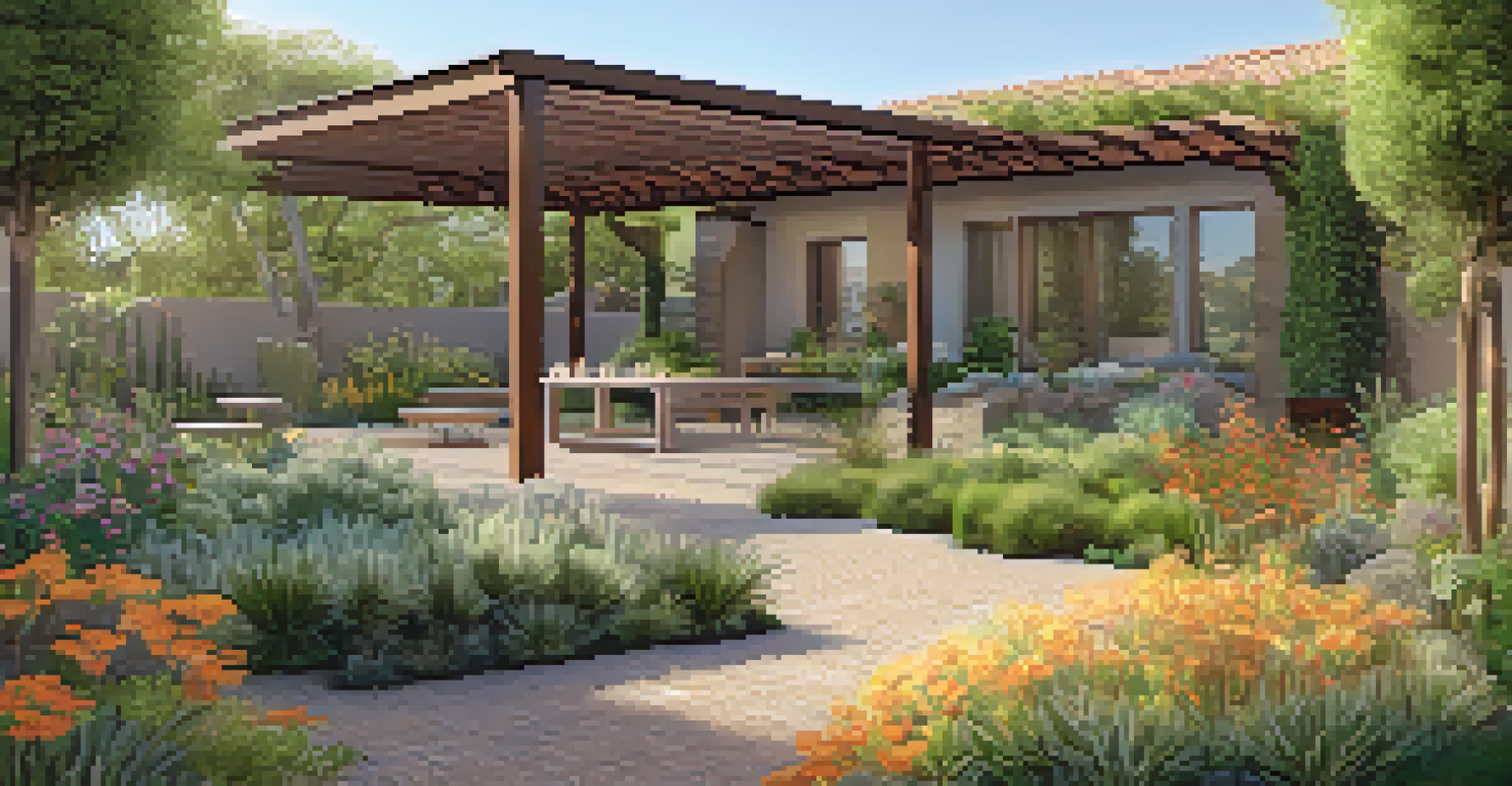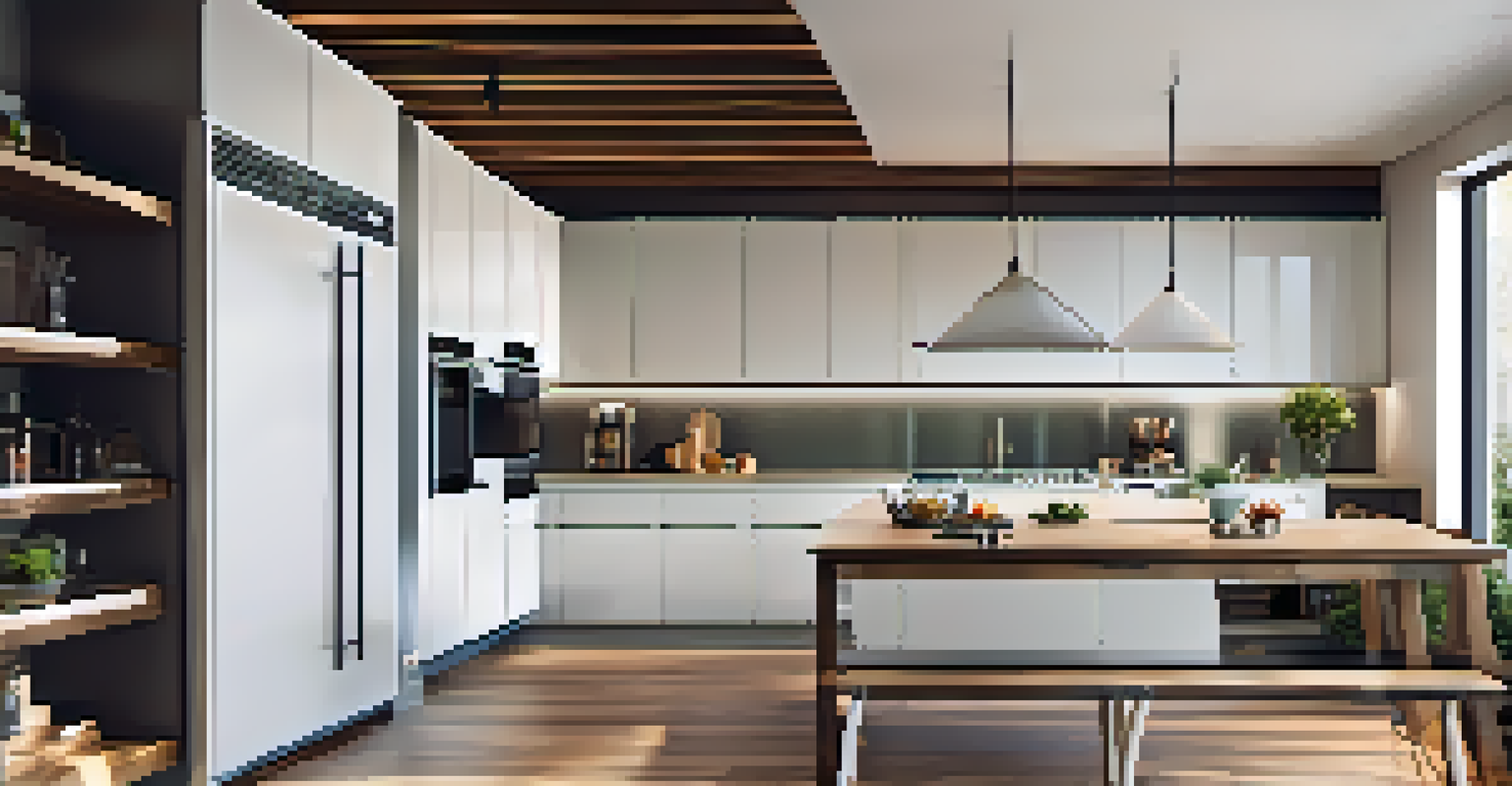Strategies for Sustainable Home Renovation Projects

Understanding Sustainable Renovation: What It Means
Sustainable renovation focuses on minimizing environmental impact while improving your home. It involves using eco-friendly materials and energy-efficient designs that benefit both the homeowner and the planet. Essentially, it’s about making choices that reduce waste and conserve resources, ensuring a healthier living space for you and future generations.
The greatest threat to our planet is the belief that someone else will save it.
This approach not only enhances the aesthetic and functionality of your home but also boosts its value. By opting for sustainable solutions, you can create a space that reflects your values and commitment to the environment. Think of it as making a long-term investment—not just in your property but in the world around you.
Incorporating sustainability into your renovation project isn't just a trend; it's a necessary shift towards a more responsible way of living. By understanding what sustainable renovation entails, you can approach your project with a clear vision and purpose.
Choosing Eco-Friendly Materials for Your Renovation
Selecting the right materials is crucial for any renovation, especially when aiming for sustainability. Look for materials that are renewable, recycled, or sustainably sourced, such as bamboo flooring or reclaimed wood. These options not only reduce environmental impact but often add unique character to your home.

Consider the lifecycle of the materials you choose. Opting for products with low VOC (volatile organic compounds) emissions can improve indoor air quality, making your home healthier for you and your family. Materials like natural stone, cork, and recycled metal are great choices that balance aesthetics with eco-friendliness.
Sustainable Renovation Basics
Sustainable renovation focuses on minimizing environmental impact while enhancing home value through eco-friendly materials and energy-efficient designs.
Remember, sustainability is not just about what you buy but also how you use it. Prioritizing durability and maintenance can lead to long-lasting renovations, further reducing waste over time.
Energy Efficiency: Powering Your Home Sustainably
Energy efficiency is a cornerstone of sustainable renovation. Start by assessing your home’s current energy use and identifying areas for improvement. Simple upgrades like installing Energy Star appliances or adding insulation can significantly reduce your energy consumption and lower your utility bills.
Sustainability is not just about doing less harm. It's about doing more good.
Consider integrating renewable energy sources, such as solar panels. While the initial investment might seem daunting, the long-term savings and environmental benefits are substantial. It’s like giving your home a green power source that pays you back over time.
By focusing on energy efficiency, you’ll create a more comfortable living space while also contributing to a reduction in greenhouse gas emissions. This approach not only benefits your wallet but also supports a healthier planet.
Water Conservation: Smart Solutions for Your Home
Water conservation is another vital aspect of sustainable home renovations. Installing low-flow fixtures and dual-flush toilets can significantly reduce your water usage without sacrificing performance. These small changes can lead to big savings on your water bill while also conserving a precious resource.
Consider using rainwater harvesting systems or greywater recycling for irrigation and non-potable uses. These systems can help you utilize water more efficiently, reducing the demand on municipal supplies. It’s like giving your home a second chance to use what would otherwise be wasted.
Energy and Water Efficiency
Improving energy efficiency and conserving water are essential practices that not only reduce utility costs but also support a healthier planet.
Incorporating drought-resistant landscaping can also play a significant role in conserving water. By choosing native plants that thrive in your climate, you can create a beautiful outdoor space that requires minimal irrigation.
Waste Reduction: Minimizing Your Project’s Impact
Waste reduction is essential in creating a sustainable renovation. Start by planning your project carefully to avoid over-ordering materials, which often leads to excess waste. Donating or recycling unwanted items can also significantly reduce the amount of debris that ends up in landfills.
Consider deconstruction instead of demolition. This approach allows you to salvage reusable materials, giving them a second life in your new space. It’s a sustainable practice that not only reduces waste but can also save you money.
Additionally, utilizing local suppliers can minimize transportation-related emissions. By sourcing materials and services from nearby businesses, you support your community while also reducing your project’s carbon footprint.
Smart Home Technology: Enhancing Sustainability
Integrating smart home technology can dramatically enhance the sustainability of your renovation. Smart thermostats, energy monitors, and automated lighting systems help optimize energy use, ensuring that you’re only consuming what you need. It’s like having a personal assistant for your home’s energy management.
These technologies can alert you to unusual energy consumption patterns, allowing you to address issues before they become costly. Plus, many smart devices can be controlled remotely, giving you the flexibility to manage your home’s energy use even when you’re away.
Post-Renovation Lifestyle Choices
Embracing sustainable practices after your renovation, like recycling and educating others, helps extend the benefits of your eco-friendly improvements.
By investing in smart home solutions, you’re not just making your home more convenient; you’re also contributing to a more sustainable lifestyle. It’s a perfect blend of innovation and eco-consciousness.
Working with Professionals for Sustainable Design
Partnering with professionals who specialize in sustainable design can make a world of difference in your renovation project. These experts can guide you through the process, helping you make informed decisions that align with your sustainability goals. Their expertise can save you time, money, and frustration.
Look for architects, contractors, and designers who prioritize eco-friendly practices and have experience with sustainable materials and technologies. They can offer valuable insights into the latest trends and innovations in green building, ensuring your renovation is both stylish and responsible.

Moreover, collaborating with knowledgeable professionals can help you navigate local regulations and incentives for sustainable building. Their guidance can lead to a smoother renovation process and a more successful outcome.
Embracing a Sustainable Lifestyle Post-Renovation
Once your renovation is complete, embracing a sustainable lifestyle is the next step. This means not only enjoying your newly renovated space but also committing to practices that uphold the principles of sustainability. Simple actions, like recycling, composting, and reducing single-use plastics, can extend the impact of your renovation.
Consider educating your family and friends about the importance of sustainability. Sharing your renovation journey can inspire others to make eco-friendly choices in their homes as well. It’s all about creating a ripple effect that promotes environmental awareness in your community.
Ultimately, living sustainably is a continuous journey. By integrating these practices into your daily life, you can enjoy the benefits of your renovation while also contributing to a healthier planet for future generations.